-
Search
-
Login
-
My Cart
If you are breastfeeding, your baby shouldn’t need to eat anything else besides breast milk, unless recommended by your baby’s doctor. It is recommended that all infants have a minimum daily intake of 400 IU of vitamin D beginning soon after birth. Ask your baby’s healthcare provider about vitamin D supplements.
For women who are breastfeeding, an ideal diet includes a well-balanced variety of healthy foods, including dairy products, fruits, vegetables, grains, and proteins. Most women can maintain a healthy milk supply by staying hydrated throughout the day and by taking in about 500 calories more per day than before becoming pregnant. It's important to eat more nutrient-rich foods. It’s also important to talk with your doctor about a vitamin/mineral supplement for you. If you notice that your baby becomes upset after some feedings, talk with your baby's healthcare professional. No one food or food group should be eliminated from your diet unless your baby has a clear reaction to a specific food
You can continue giving your baby breast milk while you are away by expressing (pumping) breast milk to be bottle-fed. Many women pump during the day while at work and breastfeed when they are home.
When you return to work, you will need a breast pump, an appropriate location to pump, a place to store your breast milk (an insulated cooler with ice packs or a refrigerator/freezer), and breast milk storage bags/bottles.
Before returning to work, talk with your employer about your need to pump and the things that will support you and your baby: break times to express your breast milk and a clean, private room (not a bathroom), where you can express milk and clean your pump parts. Your employer may already have an established lactation program to get you started. There are protections for pumping at work under the Fair Labor Standards Act, referred to as the Nursing Mothers Act, that may apply to your place of work. For more information, visit US Department of Labor.
Hospital-grade, double-sided electric breast pumps are available and provide the best way to express breast milk. Retailers also offer double electric pumps. Both are great options if you will be pumping on a regular basis. Some insurance programs offer reimbursement for breast pumps.
If you’re only going to be separated from your baby occasionally, you may consider purchasing a hand pump or learn how to express breast milk by hand.
For more information on breastfeeding, check out our Breastfeeding Basics.
Let them know they play an important role in feeding time. Studies show that with a partner’s support, breastfeeding is more successful and continues for a longer period of time. To start, they can help position you and baby for breastfeeding, provide you with a drink or snack while breastfeeding, and, if you’re expressing milk, they can take a turn and bottle-feed, which will allow them more time to bond with baby.
If you have additional questions about breastfeeding, just give us a call at 1-800-515-7677, Monday through Friday, 8:30 AM to 5 PM ET
Yes, it’s called combo feeding. It can provide some flexibility for parents who want to continue to breastfeed and formula-feed, too. This allows others to feed baby without mom being present, either during the day or overnight, or both.
When apart from your baby, you should express your milk (by hand or with a breast pump) during times your baby would be breastfeeding. This will help your body maintain your milk supply. Talk with a healthcare professional about your goals and the best way to achieve them
Yes, nutritionally it’s ok, however, many parents offer breast milk first or use separate bottles to avoid wasting breast milk. If combining breast milk and formula, prepare powder formula with water according to the label instructions first, and then combine with breast milk.
If you have additional questions about combo feeding, just give us a call at 1-800-515-7677, Monday through Friday, 8:30 AM to 5 PM ET.
During the first year, your baby will grow and develop faster than at any other time of life. What you feed your baby during the first year supports that development. If you're not breastfeeding, iron-fortified formula is recommended by the American Academy of Pediatrics.
Whether you’re feeding your baby with formula only or are breastfeeding and supplementing with formula, it’s important to know the basics for proper formula preparation and storage. Check out our Baby Bottle Basics to learn more about preparing formula.
Yes! If you’re not feeding baby right away, you can prepare bottles and store them in the refrigerator for up to 24 hours (or longer for some formulas, depending on your formula label’s storage instructions).
Once a feeding begins, use the prepared formula in a bottle within 1 hour and discard any leftovers from that bottle.
That depends on how much and how often. Many babies spit up a small amount after they’ve been fed. If you are concerned or if your baby repeatedly spits up or vomits most of a feeding, or if you notice blood in the spit-up or vomit, call their healthcare provider immediately.
Yes. Burping helps most babies remove air swallowed while feeding. Give your baby a chance to burp after every 2-3 fl oz fed (for at least the first 6 months). Hold your baby upright against your shoulder, face down across your lap while supporting their head to be higher than their chest, or upright on your lap while you support their head and chest with your hand. (You will want to place a towel on your shoulder or across your lap or hand, in case more than air comes up.) Then gently pat or rub their back for a minute or so until they burp. Babies don’t always need to actually burp after a feeding, but they should have the opportunity to do so.
Similac infant formulas are offered through the WIC program in many states. It is up to each state to determine which products they will offer through their WIC program. You should check with your local WIC office to understand which formulas are available in your area.
* WIC is a service mark of the US Department of Agriculture, and an abbreviation for the Special Supplemental Nutrition Program for Women, Infants, and Children. Requires WIC state medical documentation form. WIC state approval is subject to change. No endorsement of any brand or product by the USDA is implied or intended.
If you have additional questions about formula feeding, just give us a call at 1-800-515-7677, Monday through Friday, 8:30 AM to 5 PM ET.
It's always best to consult with your baby's pediatrician before making formula changes. Switching between different brands of formula may be difficult for your baby to tolerate. Within one brand, you’ll often find a variety of infant formulas are available for different babies’ needs.
If your baby experiences occasional fussiness or gas, ask your baby’s pediatrician about one of these Similac® formulas:
Remember, every baby is unique. Some may adjust to a new formula right away, and for others it could take up to 2 weeks.
When introducing a different formula, ask your baby’s healthcare provider about the best way to do it. Sometimes it’s advised to make the change all at once, but they may suggest a gradual transition by mixing the new formula with the one your baby is used to. Avoid switching formulas frequently unless advised by your healthcare provider, as this can disrupt your baby’s digestion.
When introducing a new formula, watch for any signs of intolerance or sensitivity, such as changes in stool or increased fussiness. These symptoms are often temporary, but if they continue, talk to your baby’s healthcare provider. Contact a healthcare professional right away if your baby develops any of the following: abdominal discomfort, a skin rash that looks like hives or eczema, vomiting, diarrhea, or difficulty breathing.
Some babies will grunt and strain when they have a bowel movement. This, by itself, doesn’t mean they are constipated. If your baby’s bowel movements look like formed, hard balls, or if they cry or are extremely distressed with bowel movements, check with your baby’s healthcare professional.
If you have additional questions about switching formulas, just give us a call at 1-800-515-7677, Monday through Friday, 8:30 AM to 5 PM ET.
As a Rewards member, you may receive infant formula samples as part of your welcome kit, as well as Similac® coupons. You’ll also have the chance to earn points toward an even bigger Reward and earn a bonus coupon by scanning the MySimilac QR code on select formula products. Plus, get special deals and freebies from our partners—like Shutterfly®!
There are 2 main ways to earn points within the program:
* Limit 5 points from scanning per 35 point Reward.
It can take up to 48 hours for your points to update and for the scan to be reflected in your account. Please check back soon!
* Free Similac comes in the form of a high-value coupon (at least $18 value) good toward the purchase of Similac. For terms and conditions, go to Similac.com.
* A $12 coupon good toward a Similac 360 Total Care 32-fl-oz ready-to-feed bottle or another Similac product, once you reach the required points threshold. Note that the coupon value may not cover the entire cost of other Similac products. Terms and conditions apply.
† Limit of two (2) $5 bonus offers throughout the life of the program. Reward and $5 bonus offer may be earned and delivered separately depending on the individual progress. $5 bonus is awarded after you have reached 35 points, with 5 of those points from product scans.
Once you reach 5 scans and 35 points total, your $5 bonus offer will be delivered to your account in about a week.
Watch the video or go to Similac.com (in Safari) on your iPhone and follow these steps:
Directions apply to Safari only.
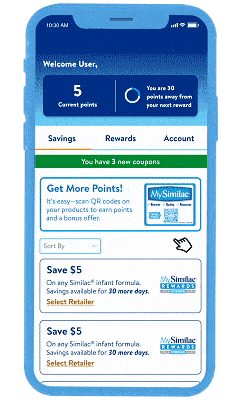
Watch the video or go to Similac.com (in Chrome) on your Android and follow these steps:
Directions apply to Chrome only.
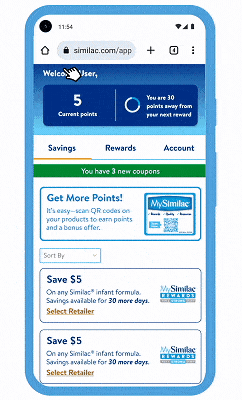
If you have additional questions about MySimilac Rewards, just give us a call at 1-800-515-7677, Monday through Friday, 8:30 AM to 5 PM ET.
Human milk oligosaccharides are unique, immune-nourishing prebiotics. They are the third-most abundant solid component found in breast milk.
Similac 360 Total Care formula is the only infant formula brand to have 5 of the most abundant HMOs that are structurally identical to 5 of those found in breast milk.
In clinical studies, babies were fed Similac 360 Total Care infant formula that has 5 HMOs, and it was well-tolerated. (Studies were of healthy, term babies from 1 month to 12 months of age. These studies were not performed with Similac 360 Total Care Sensitive.) If you have concerns regarding tolerance, contact your baby's healthcare provider.
Research shows that HMOs help support an infant's digestive health by supporting the growth of beneficial bacteria in the gut.
Human milk has over 150 HMOs, and there is a large range of HMO levels in mothers’ milk. Similac 360 Total Care has 5 of the most abundant HMOs that are structurally identical to 5 of those found in human milk.
If you have additional questions about our formula that has 5 HMOs, just give us a call at 1-800-515-7677, Monday through Friday, 8:30 AM to 5 PM ET.
Yes, most Similac products have OptiGRO, our unique blend of DHA, lutein, and a form of natural vitamin E.
On our label, non-GMO indicates that the ingredients in the product are not genetically engineered.
In simple terms, genetic engineering is the science of making changes to the genes of plants or animals. One of the first genetically engineered foods in the US was the tomato. Food experts altered the plant to help a tomato stay fresh longer after being picked.
In the US, unless it’s organic, the milk is likely from cows that have consumed feed from genetically engineered sources. According to the United States Department of Agriculture (USDA), milk from cows fed feed from genetically engineered sources is not considered to be genetically engineered. Think of it this way—the food the cows eat may be from genetically engineered sources, but the milk they produce is not.
Our non-GMO and other formulas have the same ingredients; they just have different sources for the ingredients.
Many crops in the US are genetically engineered. Our US formulas not labeled non-GMO may contain ingredients from genetically engineered crops. We’re a science-based company, so we always start with what science says. New ingredients that are added to infant formulas are assessed by qualified scientists for safety. The scientific consensus on federally approved GMO crops is that they are safe for use in foods.
Our non-GMO and other formulas have the same ingredients; they just have different sources for the ingredients. These formulas provide the same nutrition—it’s really just a matter of what a parent prefers.
Yes. We work with our vendors to verify that all the ingredients in our products labeled non-GMO are not genetically engineered in accordance with US standards.
* Ingredients not genetically engineered.
If you have additional questions about our non-GMO products, just give us a call at 1-800-515-7677, Monday through Friday, 8:30 AM to 5 PM ET.
This QR code is not on all containers yet, but we’re working to have it added to all products. The QR code can be found on the lid or back of certain products.
Yes, there are several versions of the MySimilac QR code sticker that you may see on select products. The stickers may look a bit different, but they work the same! They are all valid ways to earn a point and see the quality check information for your product.
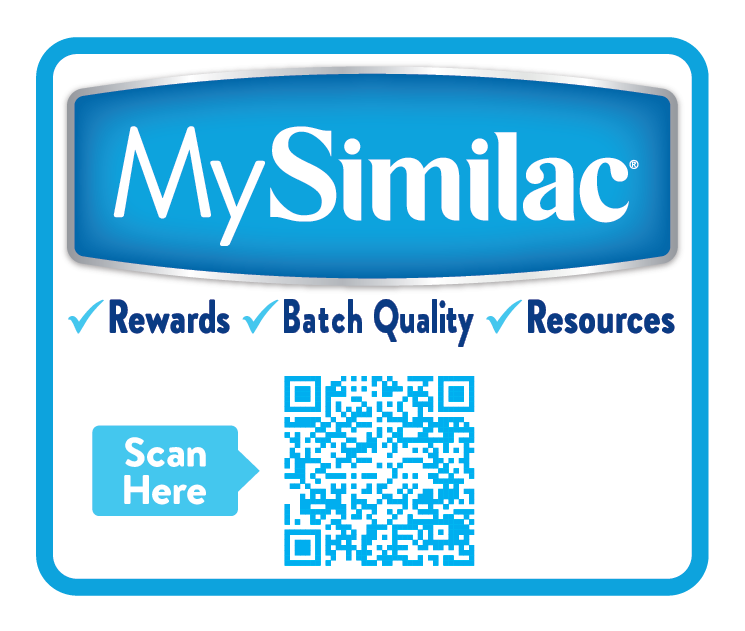
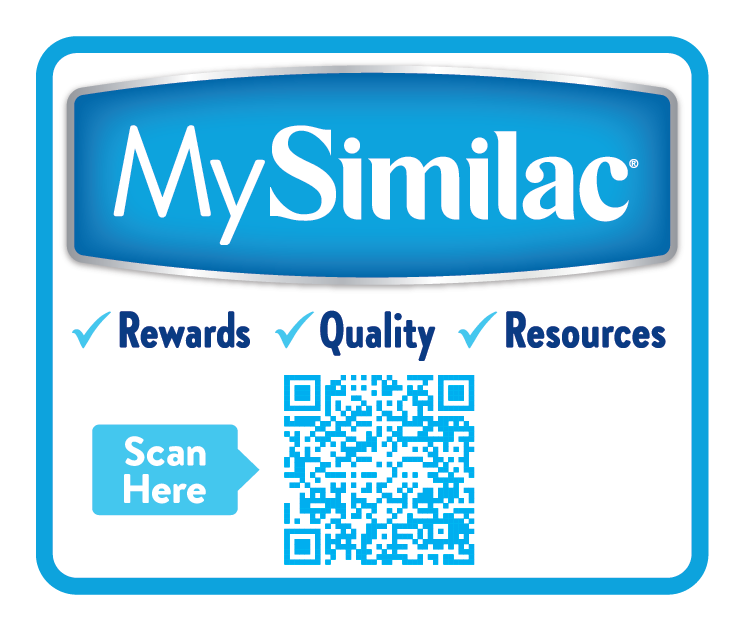
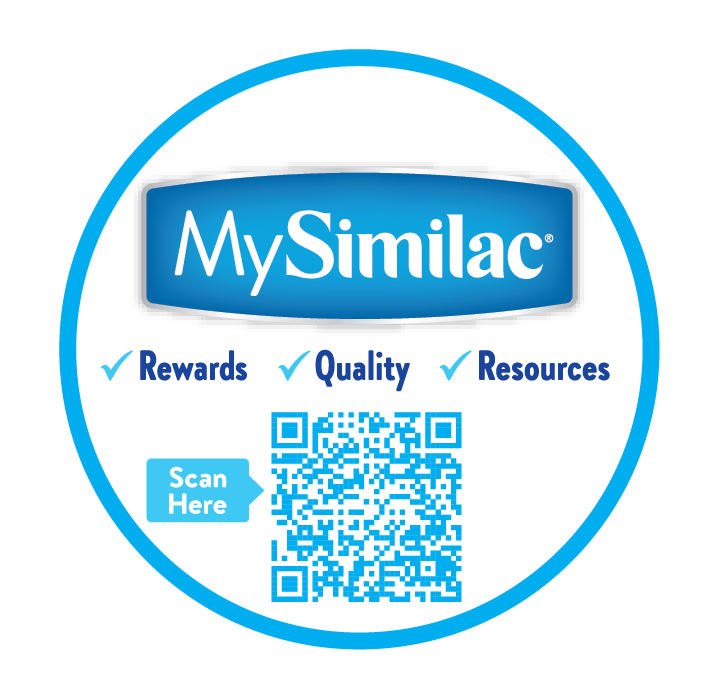
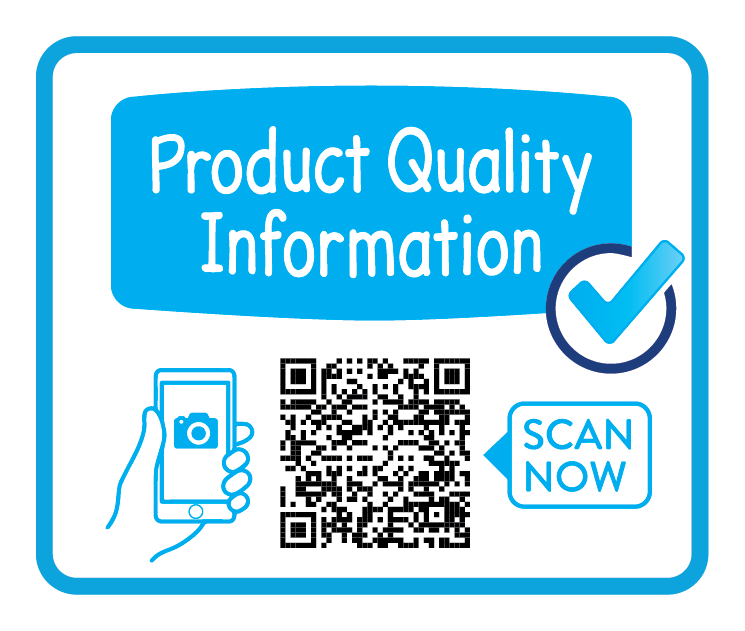
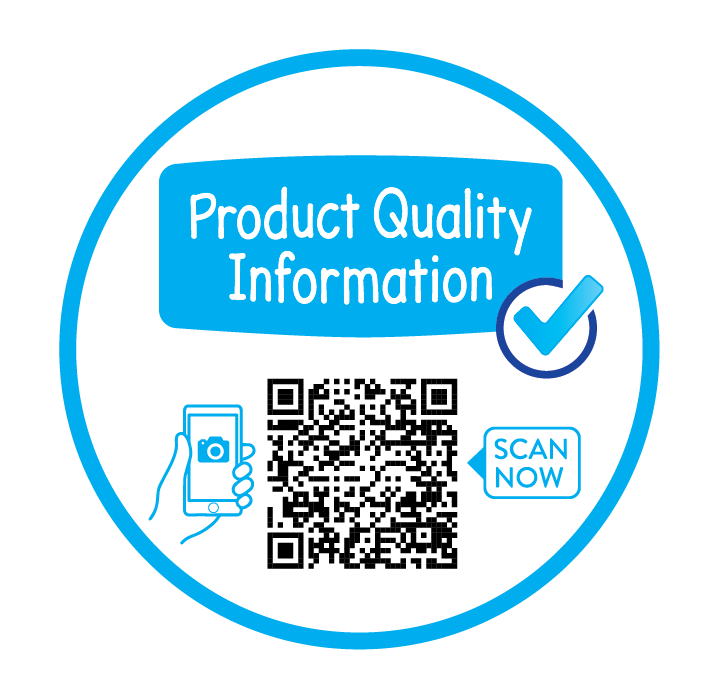
You may see a different "Scan to Save" QR code. This is for new members who still need to register for the MySimilac Rewards program. Points will not be earned for scanning this QR code.
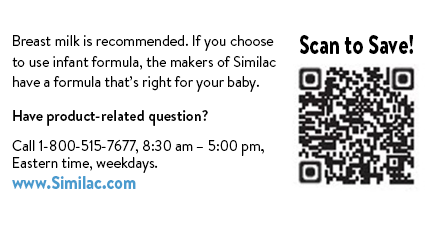
Each powdered infant formula batch is tested for Cronobacter and Salmonella, and it must test negative before the product is released.
Abbott tests nutrients such as fat, protein, and calcium to ensure our products meet Abbott specifications and FDA requirements prior to release.
Abbott conducts testing for attributes such as moisture, aroma, and flavor.
No, the release date is the date the formula was approved to be distributed. You will find the expiration date is printed on the bottom of the container or on the side label, and shows the last date the formula should be used.
If you have additional questions about the MySimilac QR code, just give us a call at 1-800-515-7677, Monday through Friday, 8:30 AM to 5 PM ET.
Join MySimilac™ Rewards for up to $400* in benefits and support throughout your journey.
* Offers may vary and are provided by Abbott and its third-party partners. Additional terms, conditions, and restrictions may apply. Offers may be subject to additional shipping and handling fees. Visiting participating healthcare facilities may be required to claim select offers.

† Submit registration to read details.

† Submit registration to read details.
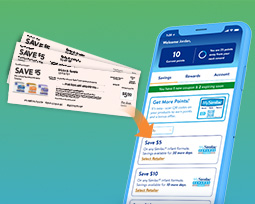
You’re just a few Clicks away from enjoying the convenience of digital savings from MySimilac™ Rewards.